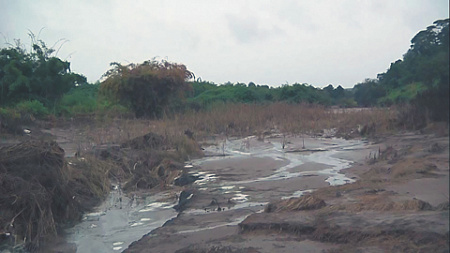
Zambian President Hakakinde Hichelema has called for assistance to the country in preventing an environmental disaster. A dam collapsed on the country’s largest river, and acid waste from a Chinese-owned copper mine got into the water. This incident casts a shadow on the reputation of China, the largest investor in the Black Continent. Nevertheless, African governments are unlikely to turn their backs on China. On the contrary, they seek to expand their cooperation with him.
The Kafue, the left tributary of the Zambezi, the largest river in southeastern Africa, was affected. According to the AP news agency, the water is contaminated 100 km downstream. Experts from the country’s leading technical institute, the Engineering Institute of Zambia, reported that about 50 million liters of toxic products got into the water. Waste is a dangerous cocktail of acid, solids, and heavy metals. The Kafue River, which stretches for 1,500 km through the center of the republic, supports the ecological system and provides millions of people with water. The Zambians are alarmed. Chilekwa Mumba, an active environmentalist, called the incident a terrible disaster. Zambia is one of the top ten largest copper producing countries. The incident has shown that there are great risks for those who provide their resources to China.
By order of the government, military aircraft drop hundreds of tons of lime into the river; speedboats ply down and up the river, also dropping lime. Zhang Peiwen, the head of Sino-Metals Leach Zambia, visited the Zambian ministers and apologized for the waste spill. According to him, the company will try to correct the damage caused to the environment as soon as possible.
Chinese interests in mining mineral resources extend to neighboring countries of Zambia, in particular Zimbabwe. In Zambia, complaints have been made against Chinese firms for ignoring safety regulations and labor laws. In addition, Zambia owes China more than $4 billion. and it was forced to restructure loans provided by China and other countries. In 2020, she defaulted on payments.
After the collapse of the dam on the Kafue River, another incident occurred. A small-scale leak was discovered from another mine owned by the Chinese. The authorities accused the owners of the small mine of trying to cover up the incident. The police reported that a worker had died at the mine. Moreover, it continued to function, despite the ban of the authorities. Two Chinese mine managers were arrested.
The tragic events in Zambia are unlikely to affect how China’s Belt and Road program is being implemented in Africa. Paul Nanatulya, an expert at the Center for African Strategic Studies, says China’s strategy is aimed at creating “interdependence” between China and other regions and countries in order to advance Beijing’s global ambitions. It was not for nothing that Chinese Foreign Minister Wang Yi toured Africa at the very beginning of January. This was his 57th visit to Africa since 2013. He visited Namibia, the Republic of the Congo, Chad and Nigeria.
Chad plays a key role in the supply of minerals used in the field of high technology and clean energy. Namibia is an important partner of China on the Atlantic coast of Africa. This country accounts for the most projects for the construction of seaports with the participation of China. And Nigeria embodies the expansion of China’s cooperation with the Economic Community of West African States. The headquarters of this community, which was built and financed by China, is due to be commissioned soon. Wang Yi’s trip took place after the summit of the China-Africa Cooperation Forum (FOCAC), held in Beijing in 2024.
As Paul Nanatulya notes, FOCAS is China’s largest and most regularly used tool to increase its influence in Africa and in other parts of the world. FOCAS has developed 10 programs. They cover areas such as industrialization, expansion of free trade zones, police cooperation, and military cooperation. After the FOCAS summit in Beijing, Chinese President Xi Jinping visited Morocco in November to loudly announce Beijing’s new programs to the entire continent.
In an interview with NG, Alexander Lukin, scientific director of the Institute of China and Modern Asia of the Russian Academy of Sciences, noted: “China in Africa, as in other parts of the world, promotes its interests, primarily economic ones. China’s development model is such that China needs raw materials for its powerful industry, needs markets for what this industry has produced, and needs to employ its workforce. The fact is that as China becomes a more developed country, it is difficult to provide jobs within the country. China also needs to use its foreign exchange reserves, which need to be invested somewhere. That’s actually what China is doing.” At the same time, China, unlike many Western countries, is not particularly interested in the political conditions, that is, the regime in a given country. “He cooperates in principle with all countries,” the expert concluded.
